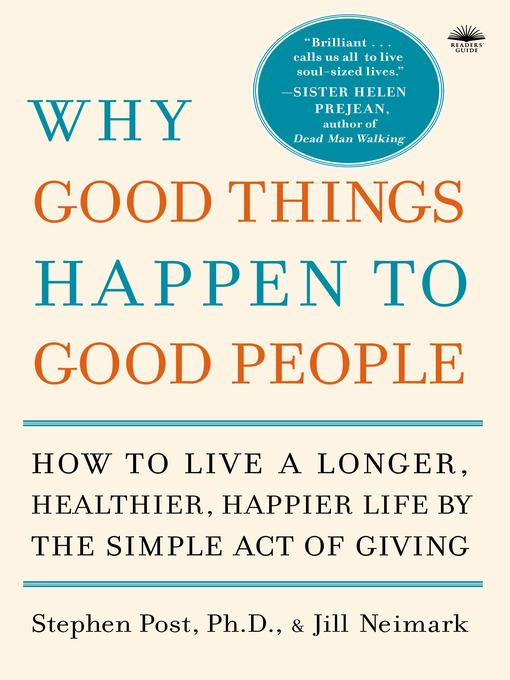
Why Good Things Happen to Good People
The Exciting New Research that Proves the Link Between Doing Good and Living a Longer, Healthier, Happier Life
کتاب های مرتبط
- اطلاعات
- نقد و بررسی
- دیدگاه کاربران
نقد و بررسی

April 30, 2007
Post, a professor of bioethics at Case Western Reserve University, outlines, as the book's subtitle puts it, "the exciting new research that proves the link between doing good and living a longer, healthier, happier life." With former Psychology Today features editor Neimark, Post cites a raft of studies (some of it funded by his Institute for Research on Unlimited Love) showing that qualities like gratitude, celebration, forgiveness and compassion are not only good for the recipients of your generosity-they're good for you too, leading to better health and longer life. Post details a self-help program based on his Love and Longevity Scale, tested on 339 college students, to measures how high you score on each quality. He also offers anecdotes (like the story of a five-year-old girl who forgave the shooter whose bullet paralyzed her) and advice to illustrate how to practice altruistic qualities. Forgiveness, for example, can be pursued through a Buddhist breathing meditation or by communing with a higher power. Post's advice to spend time helping others is grounded not only in research but in an optimistic faith in human nature.

March 15, 2007
According to Post (bioethics, Sch. of Medicine, Case Western Reserve Univ.; president, Research on Unlimited Love) and journalist and novelist Neimark, people who are generous with their time and talents live longer, healthier, and happier lives. The authors summarize results of scientific studies and identify ten ways of giving that contribute to mental and physical health, including celebration, generativity (i.e., passing knowledge and wisdom on to others, especially future generations), forgiveness, courage, humor, respect, compassion, loyalty, listening, and creativity. Each way of giving has its own chapter illustrated with inspirational real-life stories and containing simple suggestions for self-improvement. A "Love and Longevity Scale" scores readers on all ten ways of giving. The authors' advice is sound: begin first with what you do well before branching out to more difficult areas, and focus your giving across four domainsfamily, friends, community, and humanity. Highly recommended for self-help collections in public libraries.Lucille M. Boone, San Jose P.L., CA
Copyright 2007 Library Journal, LLC Used with permission.

























دیدگاه کاربران